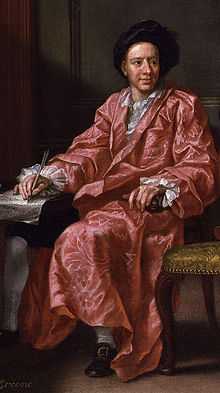Maurice Greene (composer)

Maurice Greene (12 August 1696 – 1 December 1755) was an English composer and organist.
Biography
Born in London, the son of a clergyman, Greene became a choirboy at St Paul's Cathedral under Jeremiah Clarke and Charles King. He studied the organ under Richard Brind, and after Brind died, Greene became organist at St Paul's.
With the death of William Croft in 1727, Greene became organist at the Chapel Royal, and in 1730 he became Professor of Music at Cambridge University.[1] In 1735 he was appointed Master of the King's Musick. At his death, Greene was working on the compilation Cathedral Music, which his student and successor as Master of the King's Musick, William Boyce, was to complete. Many items from that collection are still used in Anglican services today.
He wrote very competent music in the Georgian style, particularly long Verse Anthems. His acknowledged masterpiece, Lord, let me know mine end, is a representative example. Greene sets a text full of pathos using a polyphonic texture over a continuous instrumental walking bass, with a particularly effective treble duet in the middle of the work. Both this section and the end of the anthem contain superb examples of the Neapolitan sixth chord.
Works
Greene wrote a good deal of both sacred and secular vocal music, including:
- the anthem Hearken Unto Me, Ye Holy Children (1728)
- the oratorio The Song of Deborah and Barak (1732)
- the oratorio Jephtha (1737)
- the opera Florimel (1734)
- settings of sonnets from Edmund Spenser's Amoretti (1739)
- a collection of anthems (1743), of which the best-known is Lord, let me know mine end.
- the opera Phoebe (completed 1747)
He also published keyboard music, including:
- Choice Lessons, for harpsichord or spinet (London, 1733)
- 6 Overtures … in Seven Parts, arranged for harpsichord or spinet (London, 1745)
- A Collection of Lessons, for harpsichord (London, 1750)
- Twelve Voluntarys, for organ or harpsichord (London, 1779)
References
- ↑ "Greene, Maurice (GRN730M)". A Cambridge Alumni Database. University of Cambridge.
- Johnstone, H. Diack. "Greene, Maurice", Grove Music Online ed. L. Macy (Accessed 4 October 2004).
External links
 Chisholm, Hugh, ed. (1911). "Greene, Maurice". Encyclopædia Britannica (11th ed.). Cambridge University Press.
Chisholm, Hugh, ed. (1911). "Greene, Maurice". Encyclopædia Britannica (11th ed.). Cambridge University Press.
Free scores
- Free scores by Maurice Greene in the Choral Public Domain Library (ChoralWiki)
- Free scores by Maurice Greene at the International Music Score Library Project
| Court offices | ||
|---|---|---|
| Preceded by John Eccles |
Master of the King's Music 1735–1755 |
Succeeded by William Boyce |
| Cultural offices | ||
| Preceded by William Croft |
First Organist of the Chapel Royal 1727–1755 |
Succeeded by James Nares |
| Preceded by Richard Brind |
Organist and Master of the Choristers of St Paul's Cathedral 1718–1755 |
Succeeded by John Jones |
| Preceded by Thomas Tudway |
Professor of Music, Cambridge University 1730–1755 |
Succeeded by John Randall |
|